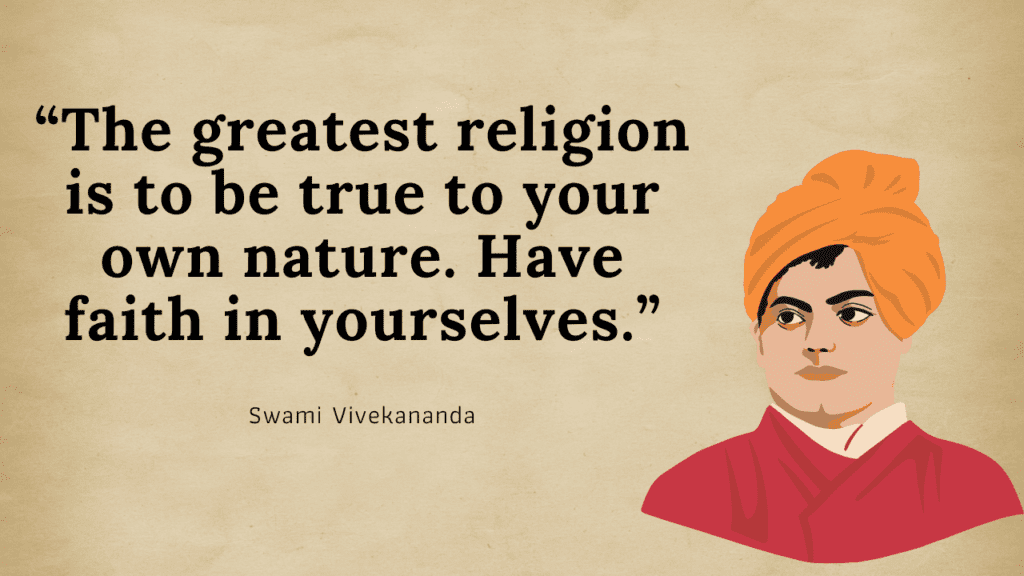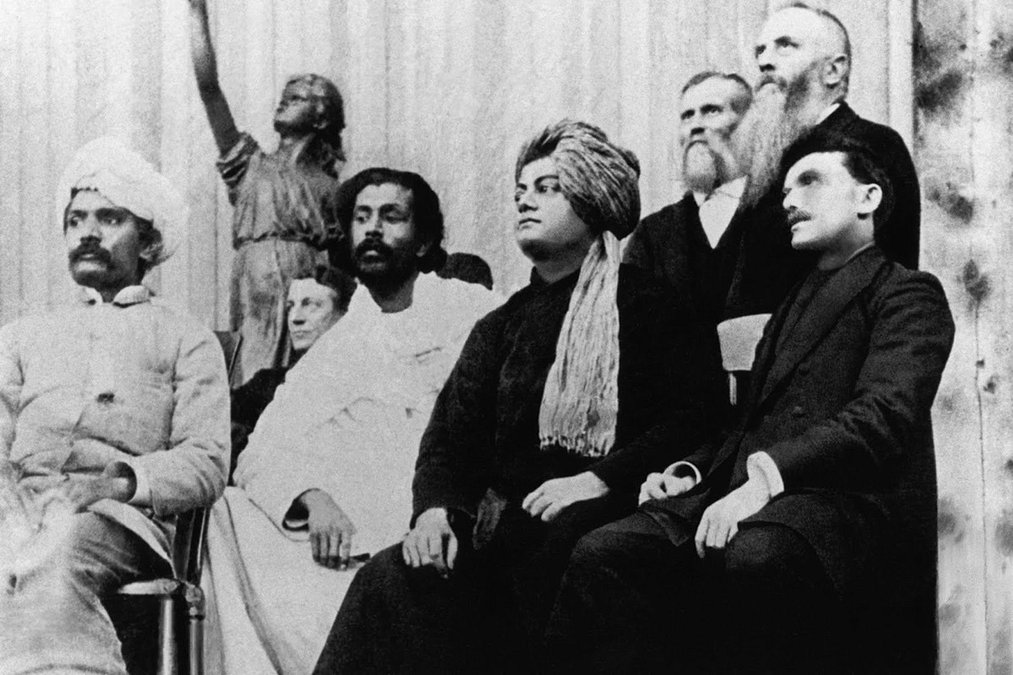When I first read Swami Vivekananda’s Chicago Speech, I was struck by how relevant it feels even today, despite being delivered over a century ago. On September 11, 1893, Vivekananda addressed the Parliament of the World’s Religions, and his words became a turning point in how the world viewed India and its spiritual wisdom. But beyond its historical significance, what makes this speech stand out is its deep spiritual essence and its message of universal harmony.
In this post, I want to take you through the core ideas of the speech and share why I think it’s a spiritual masterpiece—not tied to any particular religion, but rather, to the universal spirit that connects us all.
Chicago Speech – Original
Sisters and Brothers of America,
It fills my heart with joy unspeakable to rise in response to the warm and cordial welcome which you have given us. I thank you in the name of the most ancient order of monks in the world; I thank you in the name of the mother of religions, and I thank you in the name of the millions and millions of Hindu people of all classes and sects.
My thanks, also, to some of the speakers on this platform who, referring to the delegates from the Orient, have told you that these men from far-off nations may well claim the honour of bearing to different lands the idea of toleration. I am proud to belong to a religion which has taught the world both tolerance and universal acceptance. We believe not only in universal toleration, but we accept all religions as true. I am proud to belong to a nation which has sheltered the persecuted and the refugees of all religions and all nations of the earth. I am proud to tell you that we have gathered in our bosom the purest remnant of the Israelites, who came to southern India and took refuge with us in the very year in which their holy temple was shattered to pieces by Roman tyranny. I am proud to belong to the religion which has sheltered and is still fostering the remnant of the grand Zoroastrian nation. I will quote to you, brethren, a few lines from a hymn which I remember to have repeated from my earliest boyhood, which is every day repeated by millions of human beings: ‘As the different streams having their sources in different places all mingle their water in the sea, so, O Lord, the different paths which men take through different tendencies, various though they appear, crooked or straight, all lead to Thee.’
The present convention, which is one of the most august assemblies ever held, is in itself a vindication, a declaration to the world, of the wonderful doctrine preached in the Gita: ‘Whosoever comes to Me, through whatsoever form, I reach him; all men are struggling through paths which in the end lead to Me.’ Sectarianism, bigotry, and its horrible descendant, fanaticism, have long possessed this beautiful earth. They have filled the earth with violence, drenched it often and often with human blood, destroyed civilization, and sent whole nations to despair. Had it not been for these horrible demons, human society would be far more advanced than it is now. But their time is come; and I fervently hope that the bell that tolled this morning in honour of this convention may be the death-knell of all fanaticism, of all persecutions with the sword or with the pen, and of all uncharitable feelings between persons wending their way to the same goal.
This speech was given by Swami Vivekananda at Parliament of World’s Religions, Chicago on 11th of September 1893
A Heartfelt Beginning: Connecting Beyond Words
The Chicago speech opens with the now-famous salutation, “Sisters and Brothers of America.” This wasn’t just a formality—it was a revolutionary way to address a global audience. Those words drew a thunderous two-minute standing ovation. Why? Because Vivekananda touched something universal—the sense of kinship we all share.
Reflecting on this, I think about how often we forget to view others as our brothers and sisters. In a world divided by borders, ideologies, and opinions, these simple words remind us of our shared humanity. For me, this opening is a profound spiritual lesson: connection begins with genuine respect and love.
The Core Message: Unity in Diversity
One of the most powerful quotes from the speech is:
“As the different streams having their sources in different places all mingle their water in the sea, so, O Lord, the different paths which men take, through different tendencies, various though they appear, crooked or straight, all lead to Thee.”
What Vivekananda beautifully illustrates here is the idea that all spiritual paths—no matter how different they seem—ultimately lead to the same truth. Whether someone meditates, prays, or simply strives to live a life of kindness, the destination is the same: a deeper connection with the universal spirit.
This idea resonates deeply with me because I’ve often found myself wondering about the “right” way to practice spirituality. His words reassured me that it’s not about following a single prescribed path; it’s about staying true to what resonates with your heart.
Real-life connection: Think about friendships. Each of us has different ways of expressing love—some of us show it through words, others through actions. But the essence remains the same. Similarly, spirituality is about the essence, not the form.
A Vision for a World Without Fanaticism
In his speech, Vivekananda doesn’t shy away from addressing the darker side of humanity. He says:
“Sectarianism, bigotry, and its horrible descendant, fanaticism, have long possessed this beautiful earth… But their time is come; and I fervently hope that the bell that tolled this morning in honor of this convention may be the death-knell of all fanaticism.”
This part gave me goosebumps. It’s a call for a world where we move beyond divisions—religious, cultural, or otherwise—and embrace understanding and acceptance. In today’s polarized world, this message feels more urgent than ever.
For me, this isn’t just a spiritual idea; it’s a life principle. The next time we encounter someone who thinks differently from us, can we pause and listen instead of judging? Can we choose compassion over conflict? These small shifts in our behavior can bring Vivekananda’s vision closer to reality.
Spirituality Beyond Religion
One of the most striking aspects of the speech is how it transcends religious boundaries. Vivekananda wasn’t there to promote one religion over another; he was there to share the essence of spirituality. He said:
“We believe not only in universal toleration, but we accept all religions as true.”
This isn’t about agreeing with every belief system out there. It’s about acknowledging that there’s truth in every perspective, even if it’s not our own. For me, this is the heart of spirituality—seeing beyond labels and connecting with the essence of life.
Personal reflection: I once had a conversation with someone whose beliefs were entirely different from mine. Instead of debating, I chose to listen. What I realized was that beneath the differences, we shared the same longing for peace and purpose. That experience taught me that acceptance doesn’t dilute our own beliefs; it enriches them.
Practical Spiritual Lessons
Here are a few takeaways from the speech that have stayed with me:
- Start with Respect: Whether it’s in a conversation, a relationship, or a global forum, respect lays the foundation for connection. Vivekananda’s opening words are a testament to this.
- Embrace Diversity: Just as every river finds its way to the ocean, every individual has their own journey. Honor that.
- Rise Above Division: Fanaticism, whether in religion, politics, or even daily opinions, divides us. Choosing understanding over division is a spiritual act.
- Look Within: Spirituality isn’t about rituals or dogmas; it’s about discovering the universal spirit within ourselves and others.
Why his Chicago Speech Matters Today
Vivekananda’s speech isn’t just a historical artifact; it’s a guide for navigating modern life. At a time when we’re more connected than ever, we often feel more divided. His message reminds us that unity isn’t about erasing differences; it’s about celebrating them while recognizing the oneness beneath it all.
Every time I revisit this speech, I find something new to reflect on. It’s a reminder that spirituality isn’t about escaping the world—it’s about engaging with it fully, with compassion, courage, and curiosity.

Final Thoughts on his Chicago Speech
Swami Vivekananda’s Chicago Speech is more than just words; it’s a call to action for anyone seeking a deeper connection with themselves and the world around them. It challenges us to rise above pettiness, to embrace diversity, and to live with integrity.
As I write this, I’m reminded of another line from his speech:
“The present convention… is in itself a vindication, a declaration to the world of the wonderful doctrine preached in the Gita: ‘Whosoever comes to Me, through whatsoever form, I reach him; all men are struggling through paths which in the end lead to Me.’”
Whether you’re spiritual, agnostic, or simply curious, there’s something universal in his words. Let them inspire you to see the world—and yourself—with a little more openness and wonder. After all, as Vivekananda showed us, true spirituality is about unity, not uniformity.

